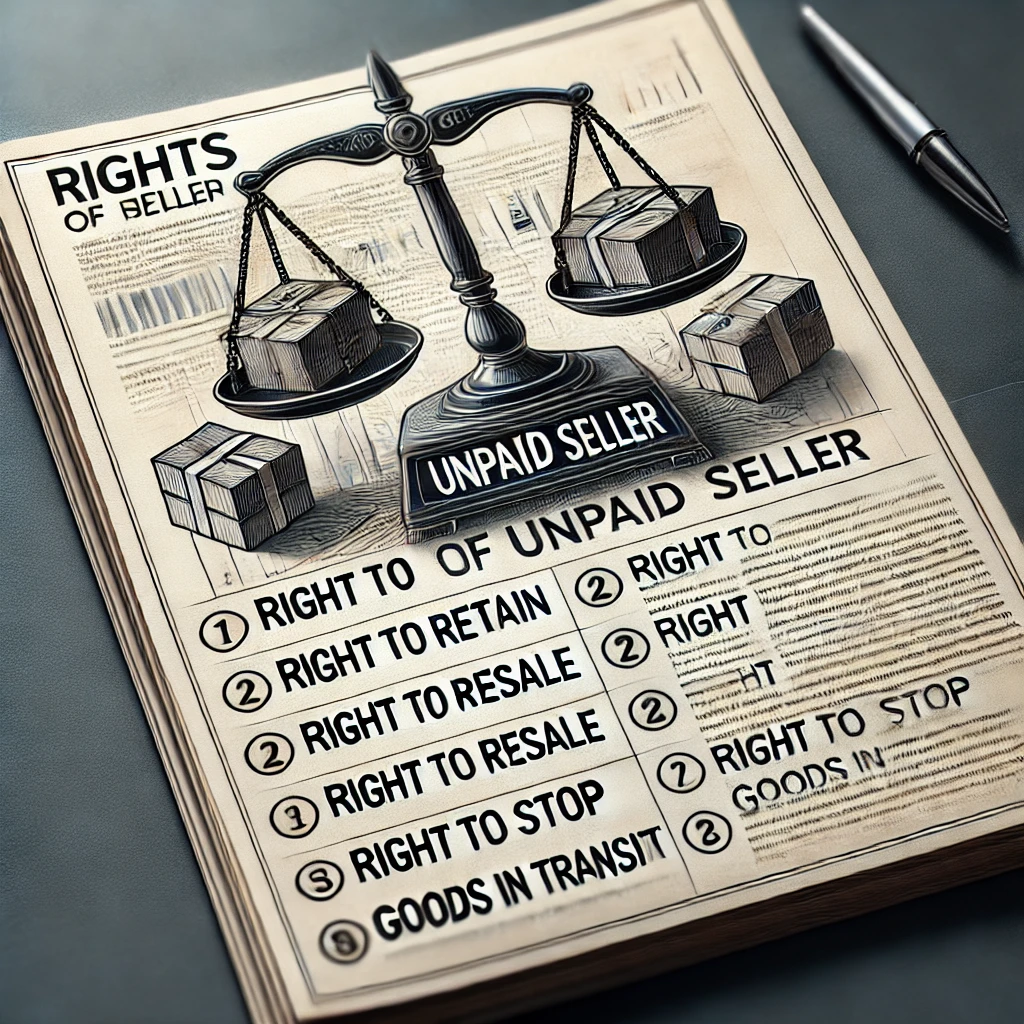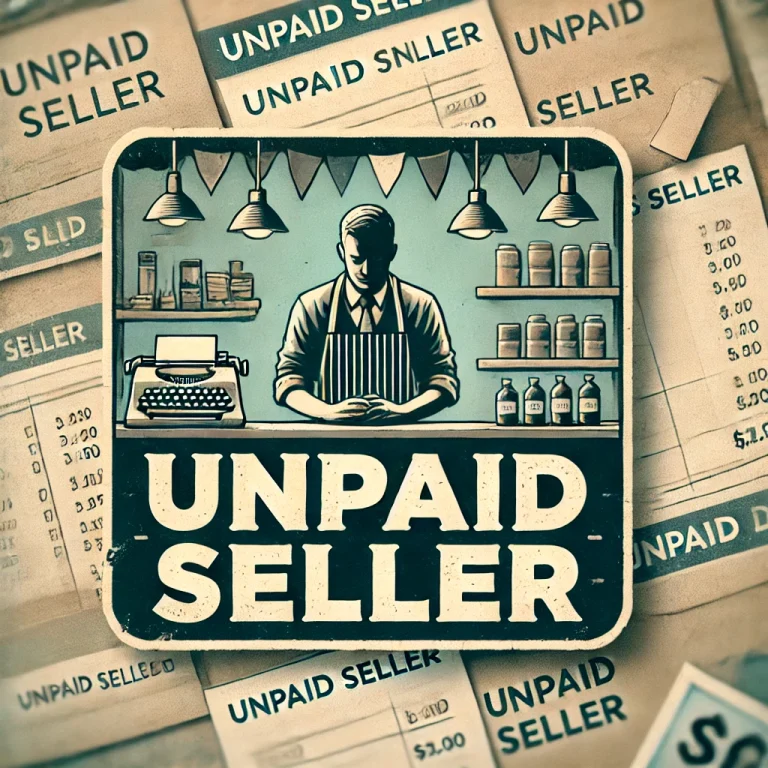An unpaid seller refers to the term used in a sales transaction about a seller who has not been paid fully for his or her goods sold or where the buyer has failed to honor the conditions of payment. This term is incorporated within business law, under the Sale of Goods Act, of 1930, which confers special rights and remedies to an unpaid seller to protect his interest. An unpaid seller in simple terms has some legal rights that do not pass out from him till he gets the payment from the buyer because the seller should not be kept unconscionable if the buyer does not pay.
Who is Unpaid Seller?
An unpaid seller is defined by the law as someone who either:
- Sold goods and received in full.
- Sold goods on credit, for which the credit period has elapsed without its realization.
- Received a negotiable instrument like a check for payment, but it has been dishonored.
The concept of an unpaid seller is of great importance in commerce since it ensures that sellers have recourse, thereby preventing bad effects of potential losses against their financial interests. It explains the legal rights and remedies that the seller enjoys when the buyers do not pay or delay payment.
Unpaid Seller in Business Law
Under the Sale of Goods Act, of 1930, in the business law, the unpaid seller is protected from financial loss through certain rights, which are provided by the law. The law of protection and enforcement of remedies that can be invoked by the seller for either reclaiming his goods or recovering his payment would come into play.
- Lien on the goods: The unpaid seller can retain possession of the goods until payment is made.
- Stoppage in transit: If goods are in transit and the buyer becomes insolvent, the seller can stop the goods.
- Right of resale: If the buyer defaults, the seller can resell the goods to another buyer.
These provisions empower the seller to mitigate risks associated with non-payment or delays, creating a balanced and fair trade environment.

What are Rights of an Unpaid Seller?
An unpaid seller has specific rights that are divided into two main categories: rights against the goods and rights against the buyer.
Rights Against the Goods
- Right of lien: In case the seller still has possession of the goods, they may retain the same until full payment has been made.
- Right of stoppage in transit: When the goods have been forwarded but are still in transit, the seller can stop the goods if they find out about the insolvency of the buyer.
- Right of resale: The right of resale is available to the unpaid seller under certain conditions, especially in cases of perishable goods or the buyer being in plain breach of contract.
Rights Against the Buyer
- Right to sue for the price: If the buyer fails to pay for the goods, the seller can sue to recover the price.
- Right to damages for non-acceptance: If the buyer wrongfully refuses to accept the goods, the seller can claim damages for breach of contract.
These rights offer a safety net for the seller and provide clear legal pathways for recovering payments or protecting themselves from financial loss.
Duties of Unpaid Seller
While the law grants the unpaid seller various rights, they are subject to certain duties. These duties ensure the seller reasonably utilizes his rights and causes no unnecessary harm or delay to the buyer. The rights include:
- Duty to deliver the goods: The seller, though he has certain rights related to the goods, has to deliver the goods if the buyer makes the payment as agreed upon.
- Duty to maintain the goods: If such goods are left with the seller and are not taken back, the seller has a duty of care over them and should not cause any damage to them.
The balance of rights and duties ensures that while the seller is protected, the buyer is not unjustly harmed, encouraging fair practices in commercial transactions.
Right of Resale of Unpaid Seller
The right of resale is an important power given to the seller when unpaid, under certain conditions. When the seller has exercised his right of lien or stoppage in transit, he may also exercise his right of resale of the goods, provided the buyer fails to pay or fulfill the contract. Resale commonly happens in the following situations:
- Perishable goods: In case the goods are perishable, the seller can resell them immediately without further ado so that loss can be saved.
- Resale notice: The seller shall give notice of resale if the goods are non-perishable.
- Legal Effects of Resale: In case the resale results in a lower price than that obtained in the original sale, the seller is entitled to recover the difference from the original buyer as damages.
This right of resale protects the seller from prolonged financial exposure while providing an opportunity to mitigate potential losses by finding another buyer.
Conclusion
All in all, the unpaid seller position is important in the commercial context, which confers sellers entitlement and protection from risks of nonpayment by buyers. The Sale of Goods Act provides for remedies such as a lien, stoppage in transit, and resale that protect sellers. It also balances both sellers’ rights and their duties so that just treatment is afforded to buyers. All these factors need to be understood by anyone in the field of commerce since they essentially reduce risks and make such trading practices much more fluid.
Unpaid Seller FAQs
What happens if an unpaid seller resells the goods without notice to the buyer?
If the seller resells without notifying the buyer (in cases where notice is required), the buyer may have grounds to claim damages if they were not in breach of the contract.
Can an unpaid seller always claim a right of lien?
The right of lien can only be exercised if the seller still has possession of the goods. Once the goods are delivered to the buyer or a carrier, lien cannot be claimed.
Is the right of resale available to all unpaid sellers?
No, the right of resale is available only under specific conditions such as buyer default or insolvency, and in the case of perishable goods.
How does stoppage in transit protect an unpaid seller?
Stoppage in transit allows the seller to halt the delivery of goods if the buyer is insolvent, ensuring that the seller does not lose both the goods and payment.
What are the consequences of dishonored checks for an unpaid seller?
If a check given for payment is dishonored, the seller retains their rights as an unpaid seller, including lien, stoppage in transit, and resale.


